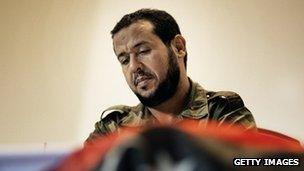Libya's Belhadj quits military post for politics
- Published

Abdel Hakim Belhadj is stepping down from his post as head of Tripoli's Military Council
Libyan Islamist commander Abdel Hakim Belhadj has resigned his military post in a bid to enter politics.
Mr Belhadj, a key brigade leader in the 2011 toppling of Col Gaddafi, plans to run in elections next month.
He is a former member of an Islamist insurgent group which sought to overthrow Gaddafi in the 1990s.
Mr Belhadj is currently taking legal action against the UK authorities, alleging they were complicit in his 2004 rendition to Libya.
He claims he was interrogated by agents from countries including Britain and United States while detained in Libya.
'Mixed views'
Mr Belhaj said he had handed in his resignation on Monday night, telling AFP news agency that it was "now time to turn to politics".
He said he quit as head of Tripoli's Military Council in order to compete in the elections next month as leader of The Nation party, which will be launched next week.
The polls see Libyans elect a 200-member Constitutional Assembly, which will draft a constitution setting out a political framework for the country after more than four decades of rule under Muammar Gaddafi.
Mr Belhadj told the BBC his message to other rebels and militiamen is to rebuild a new Libya, and that they need to join the state's security or civil institutions to do so.
Many rebels who fought to oust Gaddafi have been drawn into official security entities, but many more remain aligned to strong regional brigades, presenting a security challenge for the ruling National Transitional Council.
The BBC's Rana Jawad in Tripoli says Libyans have mixed views on Mr Belhaj's decision.
Some are wary of ex-military personalities joining politics altogether, she says, but others hope Mr Belhadj's move will encourage other rebel strongmen to abandon their guns and join Libya's political process to rebuild the country.
Meanwhile, Libyan political analyst Sami Khashkhousha told the BBC he believed Mr Belhadj's chances in politics were remote, saying liberal parties are likely to be more successful.
"The influence of Islamists on the future politics of Libya has been blown out of proportion by the media," he said.
'Apology'
Mr Belhadj was imprisoned in Libya following a secret rendition he claims the CIA carried out from Bangkok in 2004.
Earlier this year Mr Belhadj alleged that British ex-foreign minister Jack Straw and the UK government's various spy agencies were complicit in his rendition to Libya, where he says he and his wife were tortured.
Mr Belhadj told the BBC he is not asking for money, he only wants a formal apology.
Gaddafi was killed in October 2011 after a Nato-backed uprising forced him from power.